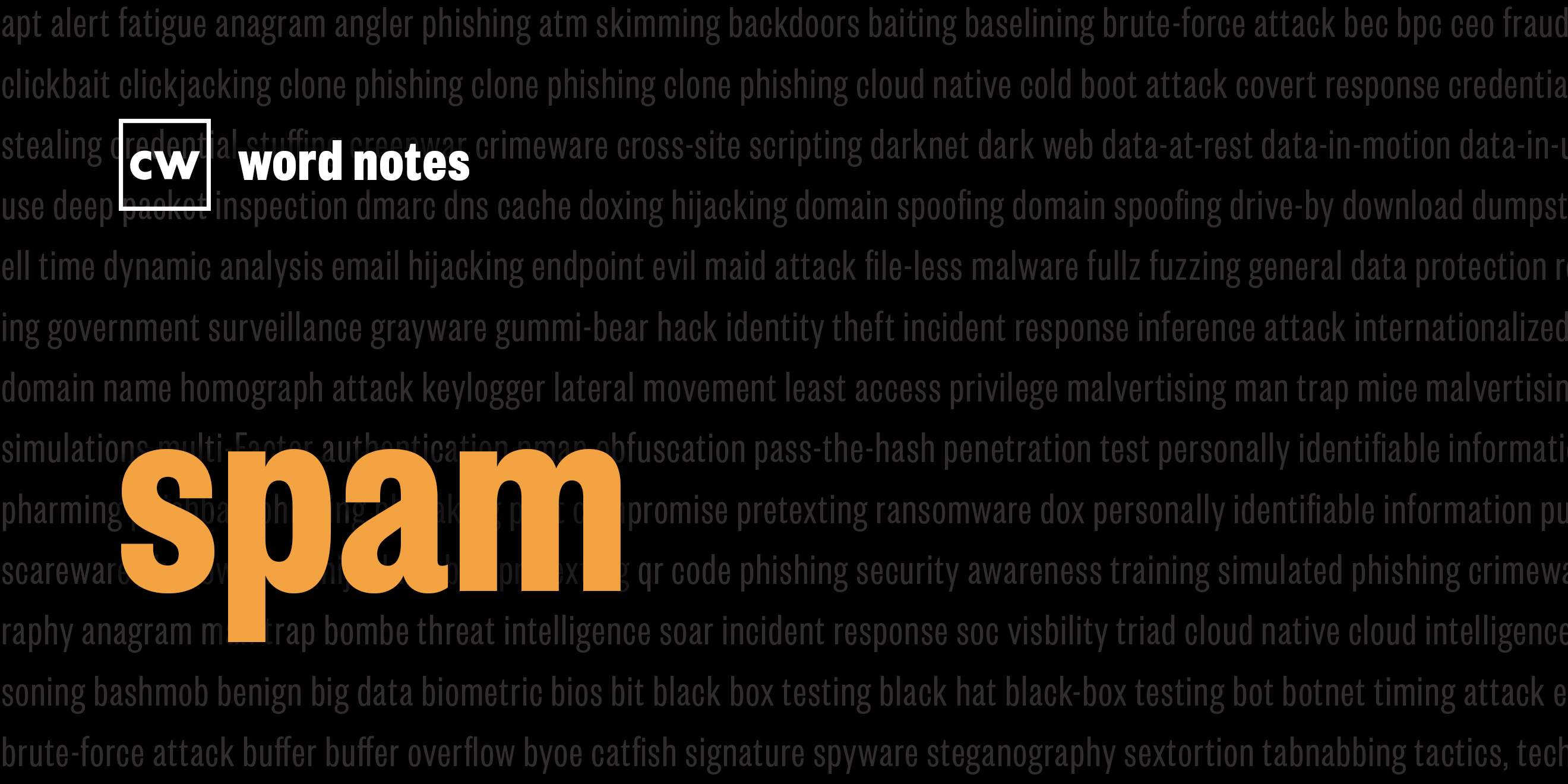
spam (noun)
Rick Howard: The word is: spam
Rick Howard: Spelled: S for solicit, P for pesky, A for annoying, and M for maddening.
Rick Howard: Definition: Unsolicited, unwanted, and sometimes malicious electronic messages indiscriminately transmitted to a large number of people.
Rick Howard: Example sentence: The user deleted all the spam emails.
Rick Howard: Origin and context: According to Brad Templeton and his excellent blog about early internet history, among other things, back in 1978, an aggressive DEC marketer named Gary Thuerk launched the first internet unsolicited bulk email campaign to roughly 400 ARPANET prospects and the idea of spam was born, although we hadn't named it yet. Complaints to Thuerk’s boss came in immediately though, and he never did it again. Still, he received 13 million in sales from this one, air quotes here, mistake. The term "spam" according to the Eater website, originated in 1937, referring to a brand of canned meat, a six-ingredient food product, where the apocryphal myth claims that the term is an acronym for "Scientifically Processed Animal Matter." Eater claims, the real name stands for "spiced" and "ham."
Rick Howard: It's unclear exactly when the internet community started referring to unsolicited junk messages as spam, but it likely started back in the 1980s with the Mudder community. Templeton describes MUDs as multi-user-dungeons. In the early days they were usually text-based, but essentially realtime multi-person environments; shared worlds where users can chat, move around and interact with locations and objects. Modern MUD successors include EverQuest, World of Warcraft and the Sims online. But even back in those early days, some mudders just wanted to annoy people.
Rick Howard: According to one player back in 1990, Andrew Plotkin, "digital spam refers to a Monty Python skit, where Vikings sing spam at a lady who floats down from the ceiling in a restaurant where they serve spam with everything." Yes, the skit is as absurd as it sounds, and for Monty Python fans, it's hilarious. According to Plotkin, "the verb 'to spam' would be to send lots and lots of useless information, in particular, the word spam repeated over and over again to mudders in the game. Today, some marketers use digital spam, not the "Scientifically Processed Animal Matter" to advertise their products, but these messages can also be malicious. Threat actors use spam to distribute phishing links and malware in mass. Even non-malicious spam can have a negative impact though. According to Proofpoint, "the receipt processing, classification and disposal of spam and unwanted mail, consumes system and employee bandwidth curating a service quality issue." I'll say.
Rick Howard: Nerd reference: For those interested in MUDS, the cybersecurity canon novel, the Blue, nowhere by Jeffrey Deaver is a cyber thriller set in the time of the 1990s internet bubble, where the good guy and the bad guy hackers use a very specific MUD to track each other down. The skit that Plotkin referred to is from a popular BBC TV show, called Monty Python's Flying Circus that aired from 1969 to 1974. And not for nothing, Plotkin signs his forum post with this statement. "A man who doesn't know his Monty Python is not a man worth talking to." Well said sir.
Eric Idle: What you got then?
Terry Jones: Well, there's egg and bacon. Egg, sausage, and bacon. Egg and spam. Egg, bacon and spam Egg, bacon, sausage, and spam. Spam, bacon, sausage, and spam. Spam, egg, spam, spam, bacon and spam. Spam, spam, spam, egg and spam. Spam, spam, spam, spam, spam, spam, baked beans, spam, spam, spam, and spam. Oh lobster theDove the moon sauce. Spam.
Rick Howard: Word Notes is written by Tim Nodar, executive produced by Peter Kilpe, and edited by John Petrik and me, Rick Howard. The mix, sound design, and original music have all been crafted by the ridiculously talented Elliott Peltzman. We're privileged that N2K and podcasts like Word Notes, are part of the daily intelligence routine of many of the most influential leaders and operators in the public and private sector, as well as the critical security teams supporting the Fortune 500 and many of the world's preeminent intelligence and law enforcement agencies. N2K strategic workforce intelligence optimizes the value of your biggest investment people. We make you smarter about your team, while making your team smarter. Learn more at N2K.com and thanks for listening.
